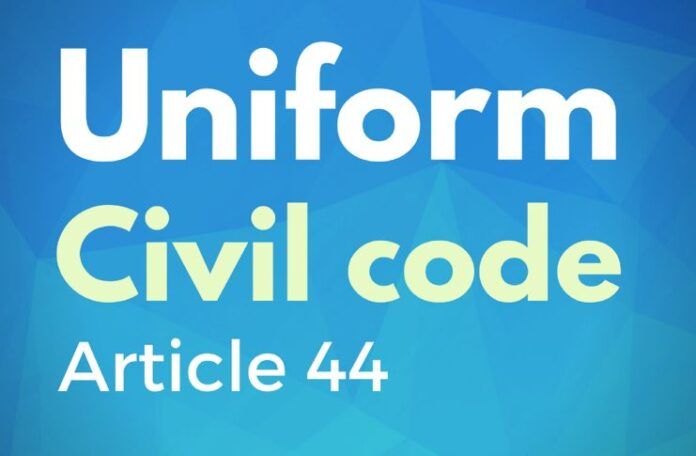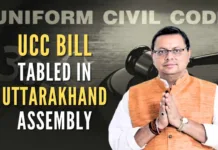
[dropcap color=”#008040″ boxed=”yes” boxed_radius=”8px” class=”” id=””]L[/dropcap]ast month, the Law Commission of India started an exercise to engage with the people and gauge public opinion on the sensitive issue of revision and reform of family laws. The objective was to address the systemic discrimination against women and harmonise various practices.
It has taken the Law Commission over six decades to finally open a healthy conversation about the viability of a Uniform Civil Code (UCC)…
The authors of India’s Constitution recognised the need for uniformity in family laws as a measure necessary to preserve the rights and dignity of women. Article 44 of the Constitution provides that “the state shall endeavour to provide for its citizens a uniform civil code throughout the territory of India”. Unfortunately, this exhortation has been systematically ignored by our policy makers.
It has taken the Law Commission over six decades to finally open a healthy conversation about the viability of a Uniform Civil Code (UCC), the topics this should include, and whether it should cover only divorce and maintenance issues, or include matters of inheritance, adoption, succession etc. The Commission intends to focus on family laws of all religions and the diverse practices in order to address the core issue of social injustice.
The idea behind family law reform is to end the degradation of women’s rights, primarily in matters of divorce, succession and maintenance. The UCC has to be formulated as a means to deliver constitutional guarantees to all citizens, regardless of religious affiliations. A secular family code that protects female rights in divorce is a must, while at the same time it must not infringe upon the specific rights of every community to perform marriage, worship, last rites etc. according to its own customs and traditions.
[dropcap color=”#008040″ boxed=”yes” boxed_radius=”8px” class=”” id=””]T[/dropcap]o understand the delays in implementation of a Uniform Civil Code, we need only look at the appeasement policies of previous governments that deliberately cold shouldered Article 44 and gave scant consideration to accomplishing the egalitarian promises of the Constitution. By far the most bruising experience for minority women in their quest for justice with divorce was the Rajiv Gandhi Government’s abject surrender before fundamentalists, viz., The Muslim Women (Protection of Rights on Divorce) Act, 1986.
This raises legitimate questions about the real role of the Congress-Left apologists in the fight for gender equality and women’s rights.
This Act nullified the judgment of the Hon’ble Supreme Court in the Shah Bano case, which dismissed the appeal against and confirmed the order of the Hon’ble High Court of Madhya Pradesh that granted a divorced Muslim woman a paltry maintenance, under secular provisions of the Constitution. The Act purported to protect the rights of Muslim women who have been divorced by, or have obtained divorce from their husbands, but was in fact a measure to scuttle a secular precedent set by the Apex Court.
This raises legitimate questions about the real role of the Congress-Left apologists in the fight for gender equality and women’s rights. It is well-known that the Act left divorced Muslim women with provision for maintenance only during the three-month period of iddah.
It is truly a momentous development when a society wakes up to the realisation of the need for change. Today, Indian society across religious and sectarian affiliations has woken up to the need for a common secular code.
[dropcap color=”#008040″ boxed=”yes” boxed_radius=”8px” class=”” id=””]T[/dropcap]he Law Commission’s exercise coincides with the initiative by some Muslim women to confront the issue of triple-talaq and nikah-halala; it is an opportunity that must not be frittered away. In fact, it was this fight by Muslim women against patriarchy and the imposition of a male-centric diktat by the All India Muslim Personal Law Board (a private body with no legal authority) that forced Prime Minister Narendra Modi to ask the Law Commission to start this exercise.
Muslim women’s activism and the Law Commission’s initiative give a ray of hope regarding the implementation of a uniform civil code…
Our Constitution makers recognised the need for a common law for all citizens to replace disparities in religious codes. The issue was keenly debated and finally Article 44 was penned as a directive for the State. Many felt that potentially explosive issues had thus been put into permanent cold storage, but now the wheel has come full circle and women have found their voice.
Unfortunately, the Left-liberals (who otherwise masquerade as women rights activists), have tried to frame the case for a uniform civil code as a Hindu-Muslim or majority-minority issue and thus impart communal colour to a matter of social reform. They have persisted on this course despite knowing that courts have continuously urged successive governments to look into the implementation of Article 44.
Constitutional law in a democratic secular republic such as India has to transcend religious laws that deny equality to all, and traditions which revoke the application of fundamental rights to all citizens.
Muslim women’s activism and the Law Commission’s initiative give a ray of hope regarding the implementation of a uniform civil code, particularly as the current political dispensation does not indulge in vote-bank politics and also seems to have the support of Muslim women and moderate Muslims in the battle for gender justice and equality.
The author’s twitter handle is @therijuluppal
- Kejriwal: Mirage of a Revolutionary - August 18, 2017
- Swachh Bharat lacks both infrastructure and Swachh mind-set - July 10, 2017
- Need for AFSPA in West Bengal - January 27, 2017











Proud of You Riju.Two big reasons for me to say so.The foremost is that you are a writer who writes with a purpose. Second,because you are an advocate by qualification and by spirit of advocacy. Love your objectivity with the crisp expression that calls spade a spade.You are the hope of tomorrow.
Keep up the good work.
Uniform civil code is a new form of abrahamism, being imposed in the name of nationalism.